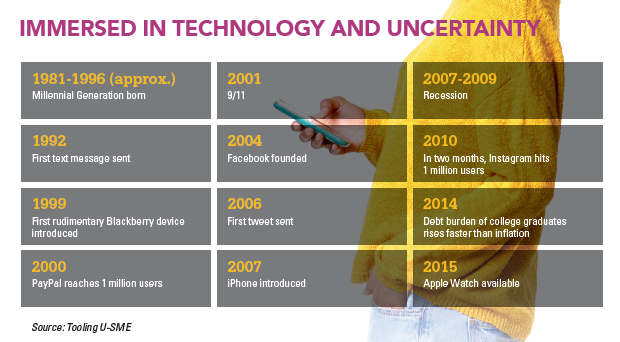What a Millennial Wants: Meeting the Needs and Expectations of Generation Y
Manufacturing is an industry that has relied on the Baby Boomers and Generation X to supply its workforce for the past several decades. But now that the Millennial Generation has come of age, many manufacturers have been left scratching their heads as to how to not only appeal to millennials, but how to retain them as well.

While every generation brings its own unique talents and challenges, the Millennial Generation was raised in a distinctly different economic time fraught with recession, rising costs of higher education and debt. Many millennials were just entering the workforce as the Great Recession hit in 2007. Job opportunities were scarce and unemployment was high. Some even gave up on looking for gainful employment. In fact, almost one-third of millennials are still living at home.
Even so, millennials have higher expectations for employers, and tend to “jump ship” if those expectations are not met. Recently, Tooling U-SME surveyed millennials about what they are looking for in a career and employer. When describing their ideal job, 72 percent said they are more likely to value opportunities for career advancement, compared to 52 percent of Baby Boomers and 64 percent of Gen Xers.
The survey also revealed that millennials want the companies they work for to have a higher sense of purpose than just making money. They care about the environment, and want their employers too as well.
Millennials want experiences at work, not just an 8 to 5 job. They want to feel valued and to contribute their own special talents to the organization.
Millennials were raised in the digital age and, therefore, interact differently with their peers and coworkers. They rely heavily on social media for communication and engagement with others, and prefer texting as a primary form of communication. Utilizing these forms of communication is an important engagement tool for today’s employers, and can increase overall satisfaction of younger employees.

Millennials are also not afraid to question authority and push boundaries. And if they are not satisfied with the work they’ve been given, the corporate culture, or their direct supervision, millennials won’t hesitate to speak up, or even look for opportunities elsewhere.
Given these differences, manufacturers need to buck their traditional way of thinking and embrace the unique characteristics of the millennial workforce in order to appeal to and retain these workers.
According to the Tooling U-SME survey, nearly half of companies are approaching recruitment differently with millennials than they did with previous generations. That’s good news.
And once a company has successfully recruited employees from this demographic, Tooling U-SME recommends seven strategies for working with and retaining millennials:
- Don’t generalize. Like all generations, this broad swathe of workers is made up of individuals with different life experiences that color their approach to work and careers.
- Communicate your corporate mission. Millennials expect companies to demonstrate a strong sense of purpose and want to be part of that. Be sure to communicate your mission and show how each individual job ties to it. Allow them to see how their talents and skills fit into the big picture.
- Show them their future. Millennials want to see their (near) future. Provide room for growth within your company so they do not feel they need to grow somewhere else.
- Provide continual learning opportunities. Millennials have a strong desire to learn and acknowledge they have things to learn. Help them gain that missing knowledge, especially by appealing to their desire for the experiential.
- Go digital. Move away from paper. Much hiring and training can now be done digitally through tablets and smartphones. Allow millennials to share their technical talents with older workers, which can create new peer connections.
- Allow them to share their ideas. Only 28 percent of millennials feel that their current organization is making full use of their skills so provide them the opportunity to show what they can do.
- Provide regular and immediate feedback. Millennials grew up with constant feedback from their parents, teachers and coaches. They expect it from you, their leader. It doesn’t have to be a long session. Just five minutes of clear, direct feedback, on a regular basis, will keep them motivated and engaged.
Some opinions expressed in this article may be those of a contributing author and not necessarily Gray.